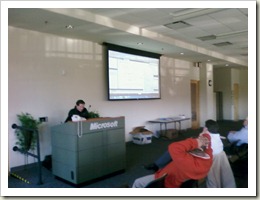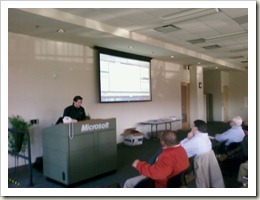Charlotte Visual Studio Ultimate Event
Here’s the link to the SkyDrive folder holding the presentation materials. There are a few slides in the decks that are from last week—I’ll probably update the overall decks over the weekend. The only difference is slightly older “branding”, since a couple of product names changed slightly. I’ll update this post later with links and other information from the event. The decks have been updated to the latest content.
Cameron’s keynote isn’t in this folder yet is in the “keynotes” folder. His blog is at blogs.msdn.com/camerons. We used the 2010 Virtual Machines from MSDN. Brian Keller has download instructions at Now Available: Visual Studio 2010 Beta 2 Virtual Machines with Sample Data. There are ALM hands on labs at Brian Keller’s Skydrive here.
All-in-all, I think it was a great day. We covered new features of Visual Studio and Team Foundation Server, Intellitrace, new testing capabilities, test management, manual and UAT testing, new aspects of .NET 4.0 and the CLR, what it’s like to be a contributor on the Visual Studio team, architecture and code visualization tools, and extensibility. We had around 80 people in the room. The room stayed full all day long.
There were some “ooohs” and “aaahhhs” over some of the new editing capabilities, and we had a lot of questions about Intellitrace. I need to write that up. People were surprised how much easier it makes debugging.
 Cameron went into an extensibility demo where he just “winged it” and added new functionality to one of the UML diagrams. He just put together a VSIX package—no complicated installers or registry changes. He even used LINQ to select the classes and ignore the interfaces on the diagram (Sweet!).
Cameron went into an extensibility demo where he just “winged it” and added new functionality to one of the UML diagrams. He just put together a VSIX package—no complicated installers or registry changes. He even used LINQ to select the classes and ignore the interfaces on the diagram (Sweet!).
(Photos taken with my Samsung BlackJack II).
A lot of people were interested in concurrency and parallel programming. You can find some information on that at msdn.microsoft.com/en-us/concurrency/default.aspx, including labs. There are also a lot of hands on labs at https://channel9.msdn.com/learn. The Windows Server 2008 R2 training kit is full of concurrency and profiling information. You’ll also find Silverlight, Windows 7, HPC, Office, SharePoint, and Identity Framework training there. Of course, I should also recommend the Visual Studio 2010 and .NET Framework 4 Training Course.
You can also look for profiler labs at blogs.msdn.com/profiler/.
If you need more to get started, let me know.